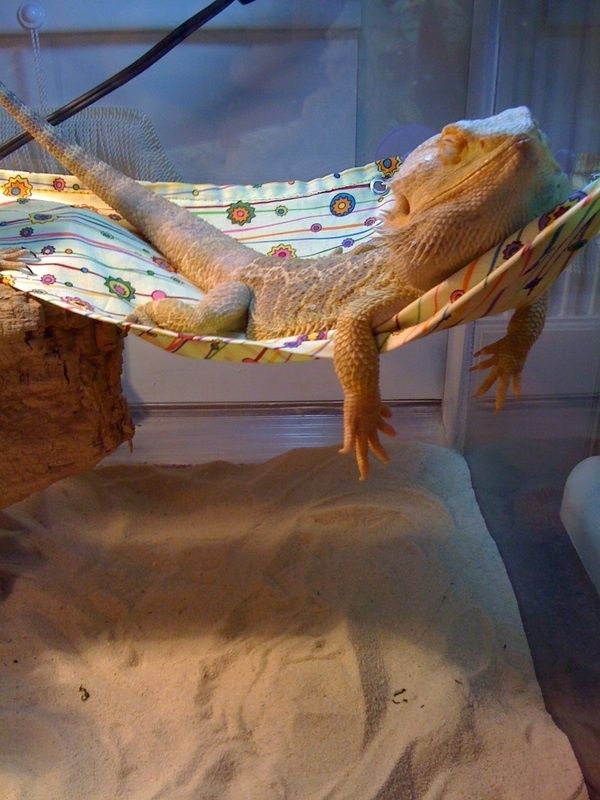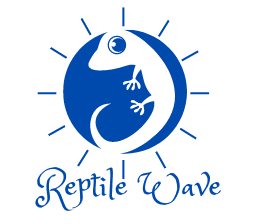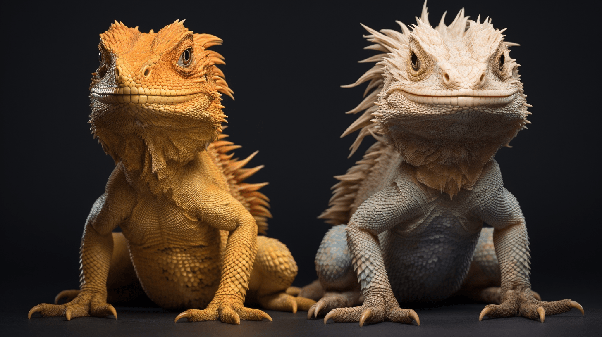Yes, bearded dragons can indeed smell. They use their specialized olfactory system, including nasal receptors, to detect scents in their environment. This sense of smell is vital for various aspects of their lives. Bearded dragons use it to find food by following scent trails, communicate through scent marking for territory or mating, and navigate their surroundings.
The sense of smell is a necessary tool that helps these reptiles interact with their environment, locate prey, and engage in social behaviors. Overall, their ability to smell plays a significant role in their daily activities and survival strategies.
Let’s go on an adventure to discover these adorable animals’ sense of smell.
Sense of Smell in Bearded Dragons
It is easier to notice how bearded dragons live and how to provide them with a pleasant environment when we are aware of their odor.
How Bearded Dragons Use Their Sense of Smell in the Wild
- Foraging for Food: Bearded dragons sniff to find food like bugs and plants. Their nose helps them know where to look for their next meal.
- Avoiding Predators: Bearded dragons use their nose to smell danger, like when a big animal is nearby. If they smell something dangerous, they’ll hide to stay safe.
- Socializing with Friends: Bearded dragons smell each other to say “hello” and make friends. They leave smells behind to mark their home and talk to other dragons.
- Finding Their Way: Bearded dragons use their nose to find important places, like water or a sunny spot to warm up. It’s like using a map to know where they are.
Compared to Other Animals
- Bearded dragons smell better than some reptiles but not as well as mammals.
- They have a special-smelling organ called the Jacobson’s organ.
- They rely on smell, but also on what they see and feel.
How Do Various Factors Impact a Bearded Dragon’s Sense of Smell?

These assist us in providing better care and maintaining the health and happiness of dragons.
Environmental Factors
Clean air helps dragons smell better. Too much dust or strong smells can make it hard for them to smell other things. Dragons like it not too hot or too cold. If it’s too dry, their noses might get too dry to smell well.
Different habitats and ground types affect how smells spread. Some grounds might keep smells better than others.
Health and Physiological Conditions
If a dragon’s nose is sick or blocked, they can’t smell as well. Infections or injuries can hurt their smelling abilities. Being healthy helps dragons smell better. If they’re sick or stressed, their noses might not work as well.
Feeling stressed can make it hard for dragons to smell things. It’s like when you’re worried, you might not notice smells as much.
Age and Developmental Stage
Young dragons may not smell as well as adults. As they grow up, their noses get better at smelling. Dragons learn about smells as they grow up. They get better at smelling things they’ve smelled before.
When dragons get old, around 8 to 10 years, their noses might not work as well. It’s like when older people start to lose their sense of smell.
How Does Smell Impact Bearded Dragons’ Survival?
Bearded dragons possess specialized olfactory receptors located in their nasal cavity. These receptors are highly sensitive and finely tuned to detect various chemical compounds in the air.
These olfactory receptors play a vital role in helping bearded dragons detect and interpret scents. When a bearded dragon breathes, the air carries scent molecules that interact with these receptors, initiating a neural response.
The sensitivity of their olfactory receptors allows bearded dragons to detect scents at low concentrations, making them adept at sensing even faint odors. This heightened sensitivity is an adaptation that serves them well in their natural environments.
Like other reptiles, bearded dragons likely have a diverse array of olfactory receptors. This diversity enables them to recognize a wide range of scents, from potential food sources to the presence of predators or other bearded dragons.
FAQs
Answers to some of the questions you ask most often are provided below.
Yes, bearded dragons have a keen sense of smell and can likely recognize and become familiar with the scent of their owners. Over time, they may associate your scent with positive experiences, such as feeding or handling.
Yes, bearded dragon enclosures can develop odors over time due to waste, uneaten food, and other factors. Regular cleaning and maintenance are essential to keep the enclosure hygienic and minimize any unpleasant smells.
Yes, bearded dragons have a strong sense of smell that they use to detect and locate prey. Their keen olfactory abilities play a crucial role in hunting and capturing food in their environment.
Yes, air fresheners and other strong scents can be harmful to bearded dragons. Their sensitive respiratory systems may be negatively affected by artificial fragrances, so it’s advisable to avoid using such products in the proximity of their enclosures.
While it’s challenging to determine if bearded dragons sense pain exactly as humans do, they can exhibit behaviors indicating discomfort. Monitoring changes in behavior, and eating habits, and seeking veterinary care when needed is crucial for ensuring their well-being.
Final thoughts
When everything is said and done, bearded dragons are sensory organs! Their sense of smell is an important tool for finding food, communicating, and navigating their world. Understanding and appreciating this aspect of their biology allows us to create a better environment for these fascinating reptiles.
So, the next time you observe your bearded dragon exploring or hunting, remember that their sense of smell is a superpower that contributes to their uniqueness and well-being as pets.

